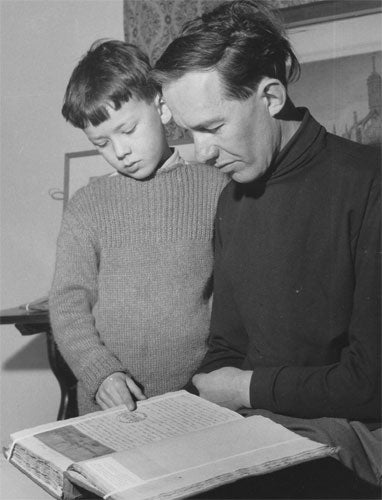Richard Hatchwell: Antiquarian bookseller whose customers included Betjeman, Sassoon, Russell and Rowse

"You know, Mr Hatchwell," a Chippenham antique dealer said to the bookseller, "it is very strange, but I have made more money out of books than anything else, yet I still know absolutely nothing about them." Richard Hatchwell moved easily in both worlds. His father, who had bought the Bell Inn at Malmesbury, later became an antique dealer himself, and his son grew up among old things. He did well at school, Dean Close at Cheltenham, where his house-master, besides imbuing him with a love of reading and literature, directed him to Thirlestaine House, near Dean Close. This was still full of the Phillipps manuscript collection, the greatest ever made. The sight of this Ali Baba's cave set the seal on his career.
Hatchwell left school in 1944 to join the Navy, and three years later was looking for a job, "something to do with books". Putting them back on the shelves of the local library was a dead end, but an introduction to the old-est-ablished London bookseller Thomas Thorp was more fruitful. Walter Harris, the manager, was kind and taught him well until he tired of London and went to manage Thorp's Guildford branch. Kept busy cataloguing the books that came in, he started going to sales. He bought a second-hand M.G., which extended his range and enabled him to get home at weekends.
In 1952 his father died, followed by his mother, and he found himself alone, aged 25, with his father's antique shop, to which he had already begun to add books. He had about £200, little enough capital, but the manager of Lloyd's Bank at Malmesbury said, "Mr Hatchwell, I have known your father, your mother, and yourself for some 10 or 15 years now. I shall honour whatever cheque you choose to write." Fortified by this confidence, Hatchwell began to build up a business that always centred round the West Country, and Wiltshire in particular. The tale of his long career is told in his memoir, Adventure, which vividly recalls the people from whom he bought books and some of those to whom he sold them.
Books did not cost much to buy, or to sell, but they were available. Both local clergy and country houses proved ready sources. A cupboard at a Welsh sale proved to contain colour-plate books. After a visit in vain to a house in Cheltenham, the owner offered Hatchwell a cup of coffee. Waiting for it in the kitchen, he noticed that the parrot's cage there was propped on a large book. He removed it (the parrot swore) and found, as he had surmised, that it was a copy of the Kelmscott Chaucer. The owner was delighted to accept his offer, the more so as it had cost nothing – she had found it in the drawer of a chest of drawers she had bought.
A.L. Rowse was an early friend and customer, and he was followed by John Betjeman, Siegfried Sassoon, and Bertrand Russell, who was delighted to find a CND poster in the shop window. Friendship with Geoffrey and Jane Grigson brought more than books: with them Hatchwell met Jane's sister Mary McIntire, and they married in 1956. Her northern warmth and hospitality enriched his life, and also the business; when their children were grown she became an expert paper-conservator. In 1960 they moved to the Old Rectory, Little Somerford, and, like the Grigsons, they bought a house in France, from which Hatchwell explored local bookshops, once discovering a first edition of Johnson's Dictionary.
Over the years Hatchwell issued some 180 catalogues. Some were built out of collections that he bought, such as the Ferdinand David collection of 18th- and 19th-century music (found in a garden shed in Oxford), the Forbes Library of dissenting literature and the works of the philosopher Thomas Hobbes; all these were bought en bloc by the University of Toronto. A group of 16th- and 17th-century Italian manuscripts made catalogues on The Papacy, and the Conflict between Christianity and Islam and Venice. The archives of the 18th-century London chemists Thomas Corbyn made another, from which also came one on the renegade American revolutionary Benedict Arnold. Pope and Voltaire were other favourite subjects.
But first and last Wiltshire, and Malmesbury in particular, remained the epicentre of Hatchwell's interests. He was on the Council of the Wiltshire Archaeological Society, and its Honorary Keeper of Prints and Drawings, in which capacity he catalogued its enormous collection of such material. His own collection of Wiltshire drawings and paintings he sold to the Devizes Museum, while his Malmesbury collection he gave to the town's Athelstan Museum.
Hatchwell never lost his inherited interest in wood furniture, and towards the end of his life commissioned two remarkable pieces of library furniture, an archive cabinet on a Chinese model of yew from an old tree blown down in the Old Rectory garden, and a library table with six adjustable desks like the 17th-century table at Autun. Both remain a memorial to a life devoted to books.
Nicolas Barker
Richard Charles Hatchwell, antiquarian bookseller: born Alton 12 January 1927; married 1956 Mary McIntire (died 1995, two sons, two daughters), 1997 Mary Prophet; died Malmesbury 30 July 2009.
Join our commenting forum
Join thought-provoking conversations, follow other Independent readers and see their replies
Comments